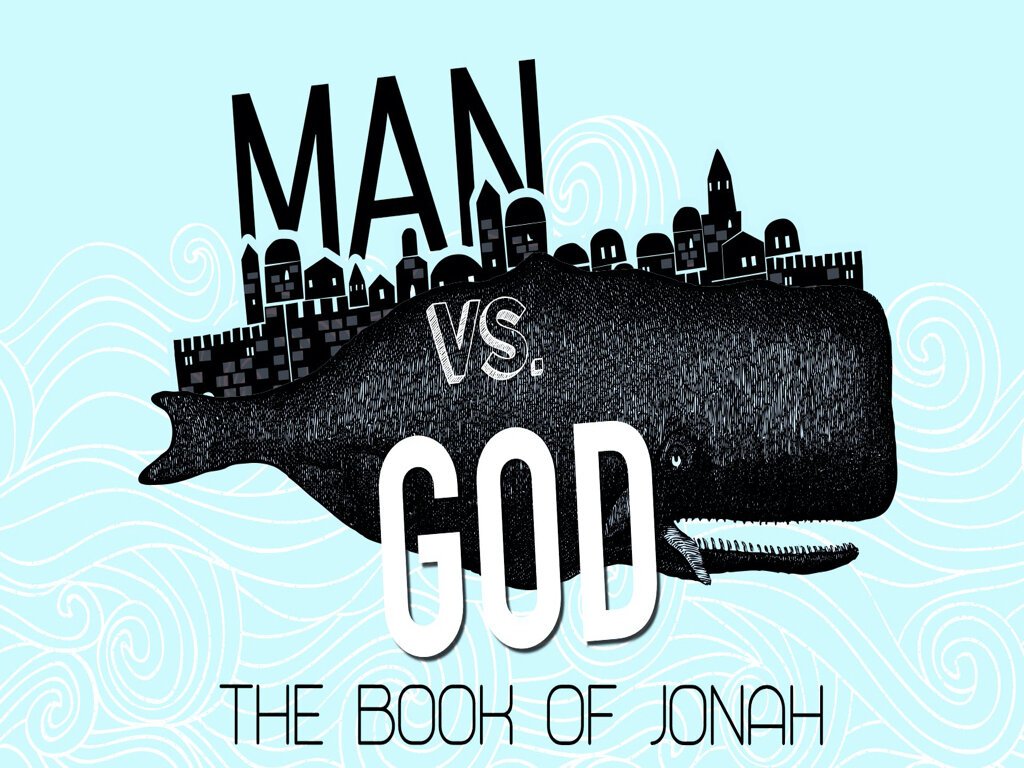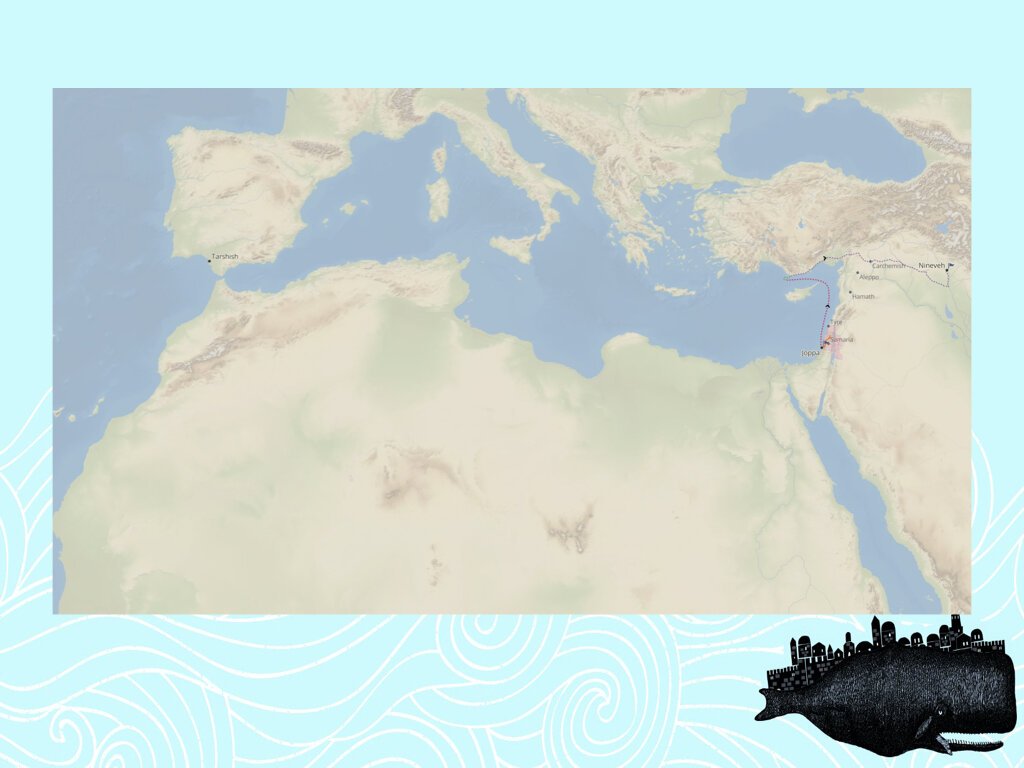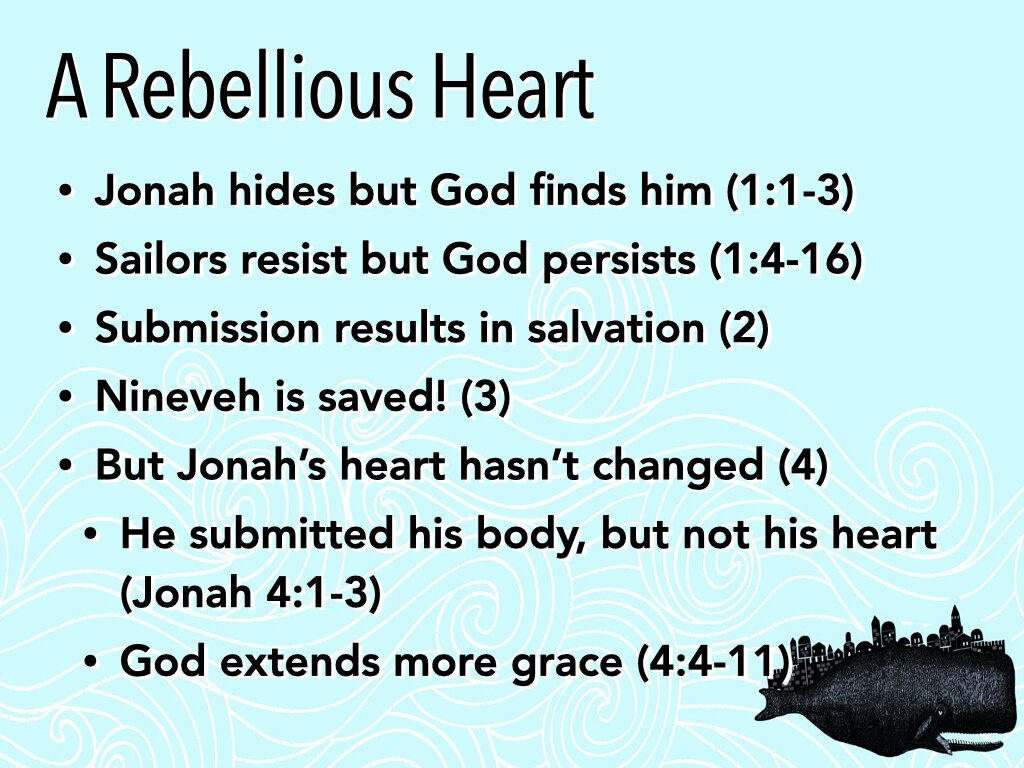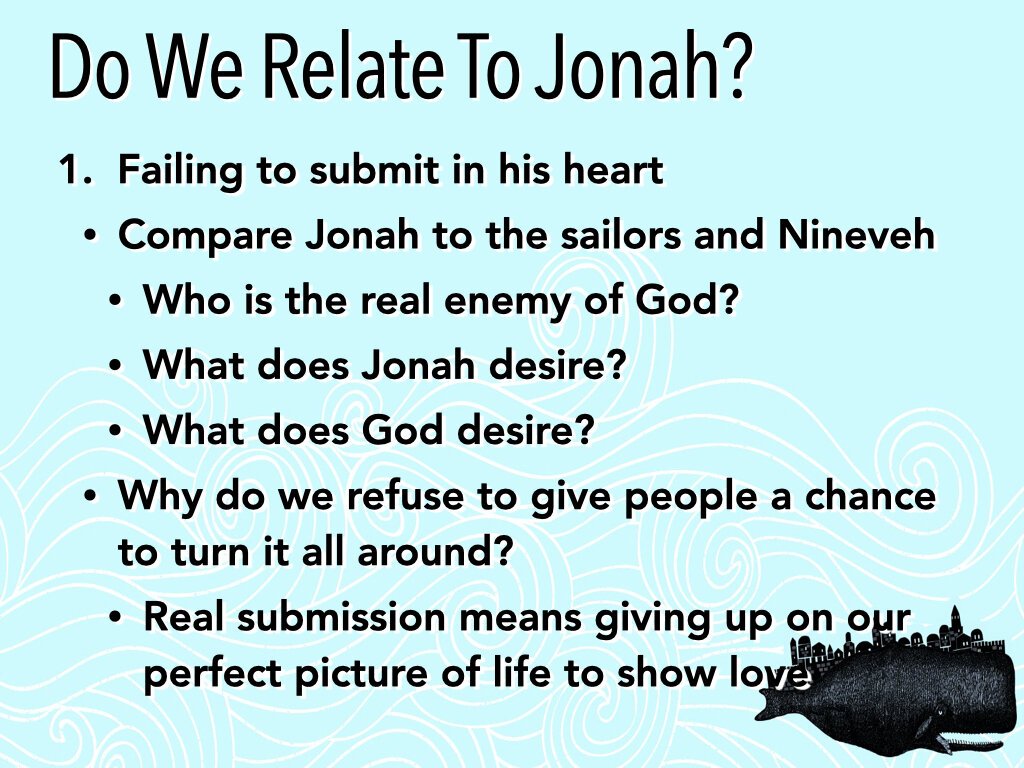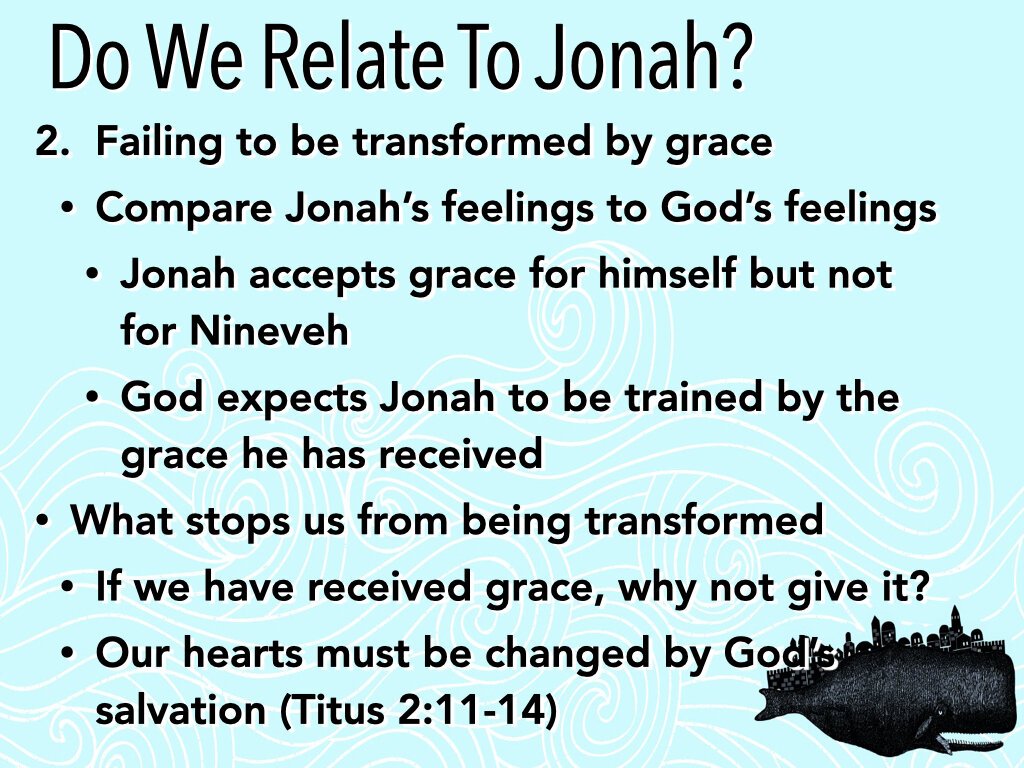Man Vs. God (Jonah)
We have looked at nearly every book in the Old Testament. We have Chronicles and four more prophesies left. All of the books we have looked at so far are about God’s relationship with Israel, but did you know there are multiple books about foreign nations? Jonah, Obadiah, and Nahum are all books written primarily about God judging foreign nations. We have seen the nations play a side role in many prophetic books. In Isaiah, Jeremiah, Zephaniah, and Ezekiel, many chapters have been used to discuss God judging them too. But they are not the primary ones being judged. Daniel is a book that meshes together Israel and the nations. So, before we get to Daniel, I want us to look at these prophecies against nations.
Tonight, we will go through Jonah. Many of us have heard the story of Jonah when we were kids, but do we really know why it’s here and what it’s about?
The Story
The word of God came to Jonah, telling him to go to Nineveh, the great city, to speak out against it for its evils have come to the Lord's attention. But instead of going to the city of Nineveh, Jonah ran in the opposite direction. He was trying to get as far away from Nineveh and Jerusalem (the presence of the Lord) as he could. So he gets on a ship and sails to Tarshish. Tarshish is on the other side of the known world. But God's presence is not limited by distance. There is nowhere anyone could go to fee from the presence of the Lord. Any attempt to do this is futile.
God sends a massive storm that nearly breaks the ship in two, and the sailors are terrified. They start throwing their cargo overboard and praying to their gods. As one of them went down into the belly of the ship, they found Jonah there sleeping. He was completely oblivious to the storm that was ready to kill him. So the sailor says, "What are you doing? Get up and help us. Pray to your god that the storm might relent. We are about to die and you are down here asleep?"
Well, nothing is working, so they cast lots to find out who is responsible for this. Somehow it was evident to these men that this storm is supernatural. This is not a typical storm. The lot falls on Jonah, and the sailors interrogate him to find out who he is, where he is from, and what he has done to provoke his God. Jonah says, "I am a Hebrew and I worship the God who created the earth and the seas." The men are terrified to hear this, and they ask him what they should do to stop the storm, but Jonah tells them to throw him overboard. These guys might be a little rough around the edges, but they know that killing someone needs to be avoided at all costs. They know that throwing Jonah overboard will undoubtedly kill him. So they try to save themselves without throwing Jonah overboard. They try to row to dry land. Do you know how hard it is to row during a storm? That is extremely dangerous as well because the ship could get turned the wrong way and roll on its side. Finally, they have to give up, and they are left with no other choice but to throw Jonah overboard. They called out to God and said, "Please don't hold this man's death against us!" Then they threw him into the water. Immediately, the sea calmed, and those men were terrified!
That should be the end of the story for Jonah. Now we should transition over to another prophet who was given this job. Jonah rebelled against God. They threw him overboard in the sea, and now he is dead, but the sailors live. You know that's not the end of the story. As Jonah is sinking, he feels the weight of his decisions. There he is falling to the bottom of the sea, surrounded by seaweed and hopeless. He starts to fade away. But then he remembers God's promises and cries out for God to save him one more time. He says or thinks, “Those who cling to worthless idols turn away from God's love for them. But I, with shouts of grateful praise, will sacrifice to you." Just then, God appoints a great fish to swallow Jonah, and Jonah can live in the belly of the fish for three days and three nights. Then, Jonah offers a prayer of praise to God, promising to fulfill his vow, and God has the fish spit him out on dry land.
Again the word of the Lord comes to Jonah, telling him to go to Nineveh, that great city, and "call out against it the message that I tell you." This time Jonah goes to Nineveh. Nineveh was a massive city at that time. It would take three days to make your way from one side of the town to the other. That is miles and miles of the city to cover. Jonah began his walk for the first day, calling out as the Lord commanded him, "Yet forty days, and Nineveh shall be overthrown!" Would you believe that the people listened? From the least of them to the greatest. They did everything to show that they greatly feared the Lord. They stopped being violent toward one another. They stopped eating and drinking. They wouldn't even let their animals eat or drink. They clothed themselves and their animals in sackcloth and sat in ashes.
Wow! That's the best possible outcome. We should read that Jonah went home and started working on Israel, but we don't read that. Instead, Jonah gets angry at God and says, "I knew it! I knew they would repent and that you would relent because I knew you would be gracious, merciful, slow to anger and abounding in steadfast love. Take my life God! I don't want to live anymore. It is better for me to die than to be alive. I give up!"
Why would Jonah say all of that? This is a pagan nation. Their evil deserves destruction. So Jonah wants them to be destroyed so that Israel can rise up to be greater than they are. He is saying, "God, I knew you would forgive them! Just kill me. I would rather die than see that I played a part in Nineveh's salvation. The thought that Jonah had helped the enemy survive made Jonah sick to his stomach. If they aren't destroyed, they will rise and destroy Israel.
Then, God asks Jonah a simple question, "Do you do well to be angry?" It is so profound that God provides an additional story to help us understand what this question means. After Jonah witnesses the people repent, he goes outside of the city and sets up a tent to see what would happen to the town. While he is watching and waiting, God appointed a plant to spring up overnight, and that plant provided him with additional shade and made him very happy. He was delighted and content by feeling the blessings of the shade tree. Then, God appoints a worm to kill the shade tree, and he sends a strong, hot east wind to wither the shade tree and blow the tent down so that Jonah was burning up in the sun. Jonah got even angrier and said, "It is better for me to die than to live." This time God said, "Do you do well to be angry for the plant?" Jonah responds to God, "YES I DO WELL TO BE ANGRY, ANGRY ENOUGH TO DIE!" Then God said, "You will be angry over the loss of your plant which you did nothing to deserve or create, and which sprang up and perished in a day. Should I not then be angry at the thought of 120,000 people and their cattle in the great city of Nineveh passing away when they don't know their right hand from their left? You take pity on the plant, should I not take pity on these people?"
The Meaning
This story is one of the greatest in the Old Testament. The story of Jonah is only 48 verses. But in this book, we find the whole Bible story in short form. God assigned a task to man, and man rebelled. God provides salvation, then those who were the worst of sinners repent while those who ought to be happy about God's salvation become jealous and angry. This is the story of the Bible in a nutshell. We see in this story the conflict that arises between man and God. Man keeps trying to fight against God for his own will to be done, but God's will will ultimately be done, and man is supposed to submit.
Rebellion Of The Heart
This is the story of a rebellious prophet. In the first chapter, we see Jonah's open rebellion as he attempts to hide from the presence of the Lord. He thinks that he will somehow be able to get away from God's presence. But God finds him in the boat. God was not fooled, and God would not bend his will to fit what Jonah wants. Did you notice how amid the storm, the mouth of the prophet proclaimed what God wanted them to do? But it didn't make sense to them, and the sailors refused to believe it. They tried to save themselves, but God wouldn't let that happen. They would have to submit to the will of God and let Jonah die. What a bizarre human sacrifice we find in this story.
Then we see God appoint a great fish to swallow Jonah. Jonah didn't ask God for the fish. His prayer shows he called out for salvation while being at the bottom of the sea, but a fish? God could have let Jonah die, but instead, he saves him with a fish. He allows him to sit in the belly of that fish for three days, thinking about what has happened. Imagine what that was like. But his prayer in chapter 2 shows that he wanted to be with God and that he wanted to make some great sacrifice for him to praise his name. Let's read that together.
Jonah 2:7--9 (ESV) --- 7 When my life was fainting away, I remembered the Lord, and my prayer came to you, into your holy temple. 8 Those who pay regard to vain idols forsake their hope of steadfast love. 9 But I with the voice of thanksgiving will sacrifice to you; what I have vowed I will pay. Salvation belongs to the Lord!"
So it seems as though there is a real change in Jonah and that now he will conform to God's will. When he gets called the second time, he goes to the city, and he preaches there. But the greatest surprise in this book is when Jonah becomes angry with God and reveals why he rebelled in the first place. It's revealed to us in chapter 4 that he didn't want to go because he knew they would change and that God would forgive them. This is the most bizarre situation. Here we have a man who appears to have changed and has been forgiven, upset because other people have changed and have been forgiven. We find out at the end of the story that Jonah hasn't changed at all in his heart. Sure, he was able to follow through and do what God commanded him to do, but his heart was nowhere near God's heart. This is the meaning and message of Jonah. Jonah never has a heart that not only submits but also longs for the will of God to be done.
Do We Relate To Jonah?
Jonah was a prophet of God. He knew who God was and what God wanted. But there were two significant problems that Jonah has to deal with. I believe these are two major problems we all have to deal with as well.
Submission
The book's first major idea can be found by looking at Jonah's response to God's purpose. According to chapter 4, Jonah ran away initially because he feared that God would relent from destroying Nineveh. He wants Nineveh to be killed by God. Jonah submits his body to going to Ninevah, but he never submits his heart to truly desire the will of God.
Do we relate to Jonah in that way? Sometimes our problem is that our feelings are not like God's feelings. Why? The only reason that makes sense is that he fears that Nineveh surviving will hurt Israel. The nation of Israel, their peace, safety, and comfort have become Jonah's idols. He values these things more than he values God. We see that he is willing to disobey the command of God to keep his idol, Israel. His attempt to flee was an attempt to keep those idols alive even though it would cost him a relationship with God. When he realizes that God forgave Nineveh, it's like his worst nightmare. He wants to die because he is the one responsible for helping his nation be destroyed. He feels like a traitor to his country, and he doesn't want to live anymore.
What do we learn? Real submission looks like giving up our perfect image of life to show love and compassion to our enemies. Jonah wanted Israel to become the greatest nation again, and he believed that could only happen if Nineveh fell. He didn't see any other way. But God wanted Nineveh to learn righteousness from his people and join them in glorifying his name.
Do we havea perfect picture of what our life should be like? What commands do we refuse to obey so that our perfect picture can survive? Do we ever run away from the commands of God to keep our idols? You might be thinking, "I don't have any idols." But is there anything you could lose that would be your worst nightmare? Would the risk of losing that thing make you disobey God? We might say, "I would rather be dead than lose my spouse, children, money, or some ability to do something." Do we see how that is our idol? Would we become angry at the loss of that? Would we say, "Yeah, I know I have Jesus and that he loves me, but THIS is what really makes me happy." We might belittle Jonah's love for the nation of Israel, but don't we love things like that? Would we hold back forgiveness from someone if they took that idol away from us? Would we be angry with God? These idols mean more to us than anything or anyone. The little story with the plant, the worm, and the wind was God's attempt to show us what every idol in our lives is like. They are all temporary blessings from God, and they're incapable of providing us with the satisfaction we crave. We feel the sorrow and pain from losing them should be the sorrow and pain that we feel toward lost souls.
We don't do well to be angry. The anger of man does not accomplish the righteousness of God (James 1:20)
God Wants Transformation
Did you notice how Jonah wants to accept the grace of God for himself, but he refuses to accept God being gracious toward those who are more wicked than he is. He refuses to go to their town and tell them what they are doing wrong. He would rather they die than repent. Why? They are so evil. How could God forgive people that evil? He is scared of them taking his rising to power again and destroying his people. The Assyrians were known for torture and ruthless slaughter. They were nasty people. They could not join Israel in honoring God (So Jonah probably thought). There is no doubt that they deserved to die, but so did Jonah, and so do we. If God wants to forgive us, we should praise him for forgiving people worse than us.
God not only shows love to the Ninevites by forgiving them, but he also offers love to Jonah a second time in Chapter 4. This time love comes in the form of a plant, a worm, and a wind. God shows Jonah love by teaching him the error of his ways. He wants to convince Jonah that he doesn't do well to be angry and doesn't need to give up on life. Instead, he needs to be excited for the turn around these many people and the salvation they have received.
Jonah knows that God is an extremely loving and compassionate God. Think for a moment about the many ways that God shows his grace in this book. God shows his grace in trying to send a prophet, sending a storm, calming the storm, appointing a big fish to eat Jonah, having the big fish spit Jonah out, sending the prophet again, forgiving the people when they repent, giving Jonah the tree, taking the tree away, and giving a scorching wind. The grace of God is seen in the good and bad of the story. God is continually working to restore man to a relationship with him. In this story, God's character is described (4:2) like Moses on Mount Sinai. This is a description repeated so often in the OT that it is ridiculous if Christians do not know it. God is a merciful, compassionate, slow to anger, and abounding in steadfast love kind of a god. His goodness never runs out. Everything he does is to help us. He is always willing to save and help if man will only turn to him and submit. In the end, he makes it clear that, in return, he wants Jonah to share his character and love for mankind. He wants him to not only love him more than anything else, but he also wants Jonah to care for the souls of others more than he cares for himself. These are the two greatest commandments: Love God more than your idols or anything else, and love your neighbor as yourself.
What gets in the way of our love for others?
Did you notice that the tree that God rose up to shade Jonah became his idol? He was more concerned about the tree going away than he was worried about the people being destroyed. This is an example of our blessings from God (our television shows, football, money, shopping, even our own family) becoming our idols. Do these things mean more to us than the souls of the lost? I am tempted to say, "No!" But how much time do I spend enjoying my blessings compared to thinking about the lost?
Jesus Preaches the Same Message
When we get to the New Testament, it is no surprise that Jesus preaches the exact same message as Jonah throughout his ministry. He commands people to give up their idols of money and comfort, to love God more than anything, and to love their neighbor as ourselves. Jesus resembles Jonah in many ways by being our sacrifice and being buried for three days and nights, but he was not rebellious. Jesus also resembles God throughout the story. He is compassionate and repeatedly reaching out for the stubborn Israelites. Before he died, he told his disciples to love each other how he has loved them (John 13:34). How hard is it to love others like that? We like to get angry with those who mistreat us, but we don't do well to be angry. We don't do well to cling to our idols. We do well to love as he has loved us. Jesus points us to this book's message so we can see our need to overcome our idols, overcome our selfishness, and love God more than anything else and our neighbor as ourselves.

